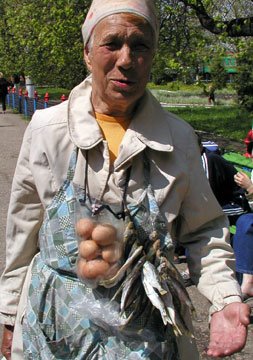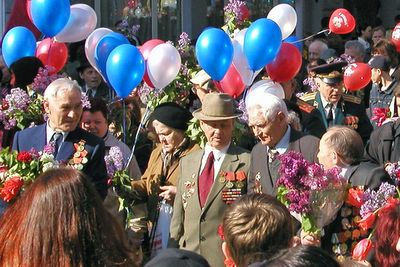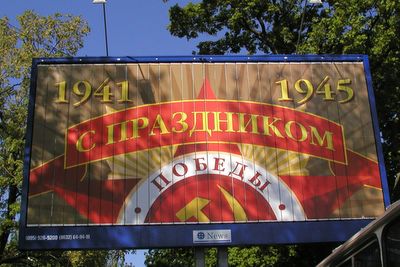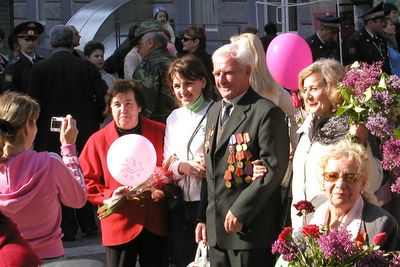We finished boarding the St Petersburg-to-Adler train, which runs along the western corridor of Russia from north to south, and were settling into our assigned compartments. I sized up the young man with whom I would be sharing space for the next 33 hours and determined that for once, I would not be the first to introduce myself. He was all business, not looking to initiate conversation and I had grown weary of introducing myself to strangers. I had just finished back-to-back conferences in Moscow and St Petersburg and spoken Russian non-stop for 12 days. My quota of extroversion was depleted and I was ready to crawl back into my shell.
Other passengers were subdued as well. Most likely they were recovering from the endless toasts of the previous day, The Day of Victory, the 9th of May, when the nation celebrates the end of Nazi occupation.
The train eased out of the station at 9:40 pm sharp and my travel companion busied himself with a crossword puzzle, taking up more than his share of the fold-down table between us. Our compartment had four berths, two on each side of the window and table. The bottom berths were ours and the top ones vacant. A sliding door separated our compartment from the long corridor.
My mood for silence didn’t dampen my curiosity about my fellow traveler, however, and I began ever so casually to gather clues. He was clean cut and his attire business casual. His jacket was perfectly tailored from wool gabardine. He wasn’t thirty yet and his thick neck, wide shoulders and square hands hinted that he had been a weight lifter or boxer some ten years and 30 pounds ago. His choice of luggage and cell phone indicated that he was of the intelligentsia and I guessed that he was into computers, perhaps a business owner.
The train was picking up speed now, heading past the Stalin-era apartment buildings that towered like unblinking sentinels over the urban sprawl. We sped through the industrial clutter into the suburbs packed with single-family dwellings, past the dachas with their weekend gardens until at last we reached the stretches of coniferous forest and groves of birch trees just starting to leaf. We could see it zoom past our window in the prolonged twilight of the far north.
It was getting late and I was plenty tired but I had misgivings about sharing sleeping quarters with this stranger. Unpleasant scenarios played in my imagination and then it dawned on me: I had packed my weapon of choice, a small New Testament. I deliberately laid the “sword of the spirit” on the table between our births, offered a polite “peaceful night,” rolled over and tried to sleep.
By noon of the next day, after we crossed the Volga and during our 25-minute stop in the village of Elets, my vow of non-communication began to dissolve.
Clamoring off the train, we were greeted by Russian grandmothers, “BAB-yshk-ee.”
“GAR-ee-ach-ee peer-OZH-kee! Hot pastries!”
“SEM-eech-kee! SEM-eech-kee! Sunflower seeds!”
The babyshkas hurried the length of the 12-car train, looking to make a few extra rubles from the traveling throng. I ended up purchasing a vast assortment of food, more than I could possibly devour, but a small price for the photos I managed to get of this slice of Russian life.
These goings-on of mine were observed with amusement by my travel companion and his new smoking buddy, a passenger I had met earlier in the corridor, who had heard my accent earlier and started speaking with me in halting English. Now he was smoking and chatting with my travel companion out on the train platform.
Back in our compartment, Smoking Buddy got promoted to Drinking Buddy. After a swig of vodka, my companion introduced himself as Aleksay and our guest, Ruslan. Aleksay offered that he could speak a bit of English.
“What is your name?” he asked, emphasizing the “what." "Who is your kompany kommander?” he asked, reddening a bit at his efforts.
Care to hazard a guess at his line of work?
“I thought you were a businessman.”
He was taken aback, as though his being military would have been obvious. Ruslan added that he also was military, an instructor at an academy of rocketry. The two of them began a routine that would continue through the afternoon. They would pour their vodka, have a short philosophical discussion while gazing wistfully out the window, make a toast on that theme, gulp the liquid fire and then disappear for a five-minute smoke.
I phased in and out of all that, toasting with bottled water and talking but mostly I was jotting down observations. I had realized earlier that the trip would be fodder for writing and scribbled non-stop about the two of them, their conversation and Russian train travel in general. But I asked questions to look less suspicious with my note taking.
“What is the Russian word for dandelion?" and “They say it’s 1,800 kilometers from St Petersburg to Rostov. So how many miles would that be?” Ruslan calculated it on his cell phone.
As the afternoon passed and vodka flowed, Aleksay continued to soften. He proposed a toast to world peace, another to the blue sky with its white clouds and another to going fishing. Into the second bottle of vodka, Ruslan started looking a bit green around the gills and he headed back to his own compartment.
“Obviously Ruslan is not a real officer.” Aleksay observed.
“PRAV-da? Really?”
“Of course. He’s only an instructor at an academy. A real officer would be able to handle his alcohol.”
That settled, we continued our trip into springtime. The vast countryside whizzed by. Gently rolling hills were draped in soft green. Clusters of homes with corrugated metal roofs were attended by fruit trees in pastel bloom. In the distance on the right was an Orthodox church, its golden cupola sparkling in the late afternoon sun. Near the tracks on the left was a babyshka squatting on her haunches, watching a few goats, a scarf knotted behind her head.
That evening Aleksay started looking out for me. At stops he would ask vendors for Cola Light, my favorite. Later he fashioned a vase from a plastic bottle for the bouquet of lilacs I had found and by the time our train pulled into our destination just before dawn, he proceeded to haul my 22-kilogram suitcase down the steps.
What a gentleman, I thought as he hurried off to jeep awaiting him.
After getting home, I noticed that the tag was missing off my luggage. I always label each piece, inside and out, with my name and the church address and telephone number. I had not taken that tag off but it was gone. I wondered if Aleksay had snipped it off when I had stepped out of the compartment. But I smiled realizing that the worst thing that could happen would be Aleksay Vladimirovich’s showing up at our church building out of curiosity. And perhaps he would be interested in learning more. That wouldn’t be the first time in history that an unlikely character had been interested in the Good News. After all, one of the first converts in the first century was Cornelius. And he was an army officer, too.









